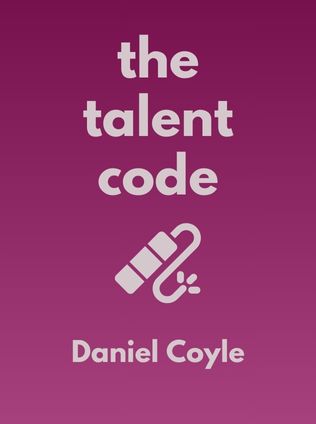
The Talent Code
Unlocking the Secret of Skill in Sports, Art, Music, Math, and Just About Everything Else
By Daniel Coyle
Published 01/2009
About the Author
Daniel Coyle is an accomplished author and journalist, renowned for his insightful explorations into the science of skill acquisition and performance optimization. Coyle's body of work includes bestselling books such as The Talent Code, The Culture Code, and The Little Book of Talent. His writing is characterized by a unique blend of scientific research, compelling storytelling, and practical advice, making complex concepts accessible and engaging for a broad audience. Coyle has written for prominent publications including Sports Illustrated and The New York Times, and his investigative approach often takes him into the heart of extraordinary environments, from sports academies to elite music schools, where he uncovers the secrets of high performance.
Main Idea
In The Talent Code, Daniel Coyle embarks on a quest to uncover the true source of great talent. He challenges the traditional nature versus nurture debate by presenting compelling evidence that talent is not merely an innate gift but can be developed through specific practices and conditions that leverage our biological potential. Central to his thesis is the concept of myelin, a substance in the brain that plays a crucial role in skill development. Coyle argues that with the right kind of practice, motivation, and guidance, anyone can cultivate extraordinary talent.
Table of Contents
- Introduction
- Myelin Matters
- Meaningful Practice
- Impassioned Motivation
- The Role of the Coach
- Conclusion
Introduction
The introduction of The Talent Code sets the stage for an exploration into the origins of talent. Coyle introduces the reader to various "talent hotbeds" around the world, such as a music academy in upstate New York, a tennis club in Moscow, and a soccer field in Brazil. These are places where an unusually high number of top performers are produced. He raises the central question: What makes these places so special? Through compelling stories and scientific insights, Coyle begins to unravel the mystery of talent.
Myelin Matters
Central to Coyle's thesis is the concept of myelin, a fatty substance that wraps around nerve fibers and increases the speed and strength of neural signals. He explains that myelin growth is stimulated by deep practice, which involves pushing oneself to the edge of one's abilities. This process, Coyle argues, is the foundation of skill development.
In Coyle's words:
"Talent isn't born, it's grown. And the process of growing it is the same whether you're a musician, athlete, or mathematician." - Daniel Coyle
The Nature Versus Nurture Debate
Coyle's argument that talent is developed through practice rather than being innate is a significant contribution to the nature versus nurture debate. He contrasts his views with those of proponents of genetic determinism, such as the authors of The Bell Curve. Coyle aligns more closely with thinkers like psychologist Eric Turkheimer and author Malcolm Gladwell, who emphasize the role of environment and practice in realizing one's potential.
What Is Myelin?
Myelin's function in the brain is crucial to understanding skill acquisition. This fatty substance acts as insulation for neural pathways, allowing electrical signals to travel more efficiently. Coyle explains that repetitive practice strengthens these pathways by increasing myelination, making actions faster and more precise. This neurological process underpins the development of what we perceive as talent.
As Coyle elaborates:
"All of our thoughts and actions are the result of electrical signals being transmitted across networks of neurons in the brain. Myelin forms a sheath around the axon of each neuron, acting as insulation that prevents electrical signals from leaking out of the pathways between neurons, thereby increasing the signals' speed and strength." - Daniel Coyle
Why Does Myelin Matter?
Coyle highlights two key benefits of myelin: increased impulse speed and automaticity.
Sign up for FREE and get access to 1,400+ books summaries.
You May Also Like
The Subtle Art of Not Giving a F*ck
A Counterintuitive Approach to Living a Good Life
By Mark MansonRich Dad Poor Dad
What the Rich Teach Their Kids About Money - That the Poor and Middle Class Do Not!
By Robert T. KiyosakiHow To Win Friends and Influence People
The All-Time Classic Manual Of People Skills
By Dale CarnegieFreakonomics
A Rogue Economist Explores the Hidden Side of Everything
By Steven D. Levitt and Stephen J. Dubner



















